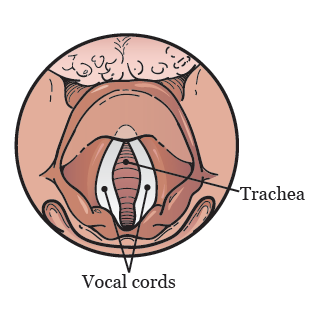What Term Describes Paralysis of the Larynx
The scientific name for paralysis of the larynx is laryngoplegia. This condition can be caused by a number of injuries and illnesses.

Vocal Cord Paralysis Memorial Sloan Kettering Cancer Center
In this disorder there is some loss of function in the laryngeal muscles that normally open the larynx when an animal breathes in.

. This results in paralysis of the vocal cord muscles. Laryngeal paralysis is caused by disruption of nerve impulse transmission to the larynx. Build a word that means paralysis of the larynx.
Difficulty breathing in any position except when sitting or standing is known as. Vocal cord paralysis can affect your ability to speak and even breathe. Some authors use the term irritable larynx syndrome ILS in a similar context.
Vocal cord paralysis occurs when the nerve impulses to your voice box larynx are disrupted. Laryngeal paralysis is an upper-airway disorder where the cartilages of the larynx do not open and close normally. Thats because your vocal cords sometimes called vocal folds do more than just produce sound.
The larynx is a term used to describe the cartilages that surround the rima glottidis and that are responsible for control of airflow during respiration. Paralysis of the larynx paresis of the larynx is a disorder of the motor function in the form of a complete absence of voluntary movements due to a violation of the innervation of the corresponding muscles. Partial paralysis of the larynx is a term often used to describe a hypomobile vocal fold as is the term paresis We present a case of a dysphonic patient with a mobility disorder of the vocal fold for whom idiopathic partial paralysis was the diagnosis made after laryngeal electromyography and discuss a proposition for a different implementation of the term.
McGraw-Hill Concise Dictionary of Modern Medicine. The term laryngeal neuropathy LN has first been used in veterinary medicine to describe an idiopathic and typically exercise induced inspiratory noise in horsesNowadays the term is often used in relation with intermittent vocal cord pareses in humans. 2002 by The McGraw-Hill.
Laryngeal paralysis ENT Loss of function of one or both vocal folds. For this reason your doctor may delay permanent. The result is airway obstruction to varying degrees causing loud and labored respiration.
As a result speech and vocalization function can be severely impacted. People have one set of two vocal cords also known as vocal folds that work together in your voice box to produce sound. - partial paralysis to both recurrent laryngeal nerves bruising of both nerves for some reason causes the vocal fold to move into the midline and shut the larynx.
Treatment of vocal cord paralysis depends on the cause the severity of symptoms and the time from the onset of symptoms. They open when you breathe in to let the air flow through your lungs and they close and vibrate when you speak this is called. -pharynx -larynx paralysis of LMNs can occur -at the nerve nucleus -in the peripheral pathways to the laryngeal muscles 0may be uni or bilateral muscle tone of LMN -flaccid -atrophy what might cause vagal nerve damage -trauma to brainstem bc of accident -surgery -tumor in which order do the vagal branches go from superior to inferior.
It is an inherited disease generally characterized by infection and disorders of other organs. Specifically the muscle that causes abduction of the arytenoid. This is life threatening.
Another term might be vocal cord paralysis. It can result from many disorders such as emphysema or chronic asthma. Which term means paralysis of the larynx.
If only one is bruised then the affected one will move into the midline larynx not completely shut as the other vocal fold keeps it partially open. See Recurrent laryngeal nerve. Laryngeal paralysis is caused by damage to the.
The larynx or voice box is the opening to the trachea windpipe that allows your cat to meow but also acts as a gatekeeper between the mouth and the lungs. In some instances you may get better without surgical treatment. Resulting from paralysis of the laryngeal nerve which innervates the intrinsic laryngeal muscles vocal fold paralysis VFP is the result of a number of conditions including head or neck injury stroke tumors infections or other neurological issues.
Apnea is a term used to describe the temporary absence of spontaneous breathing. Use Brady- slow to build a word that means slow breathing. Infantile apnea occurs in children under the age of one year.
It is a disease process that decreases the ability of the lungs to perform their ventilatory function. Laryngeal paralysis in animals is a condition in which the nerves and muscles that control the movements of one or both arytenoid cartilages of the larynx cease to function and instead of opening during aspiration and closing during swallowing the arytenoids remain stationary in a somewhat neutral position. Treatment may include voice therapy bulk injections surgery or a combination of treatments.
This is caused by degeneration of certain nerves involved in normal breathing. When the cat inhales muscles pull the larynx open from two sides and. Vocal cord paralysis and paresis can result from abnormal function of the nerves that control your voice box muscles laryngeal muscles.
Laryngoparalysis or laryngoplegia is paralysis of the larynx or voice box. The four cartilages that make up the larynx are the paired arytenoids and the unpaired epiglottis cricoid and thyroid cartilages. It is also called chronic obstructive lung disease.
In the Dalmatian this condition is part of a more widespread condition of the. Lack of impulse conduction to laryngeal muscles results in the inability to abduct arytenoid cartilage and vocal folds. This interruption may be either from damage to the vagus or recurrent laryngeal nerves and may be either congenital or acquired.



Comments
Post a Comment